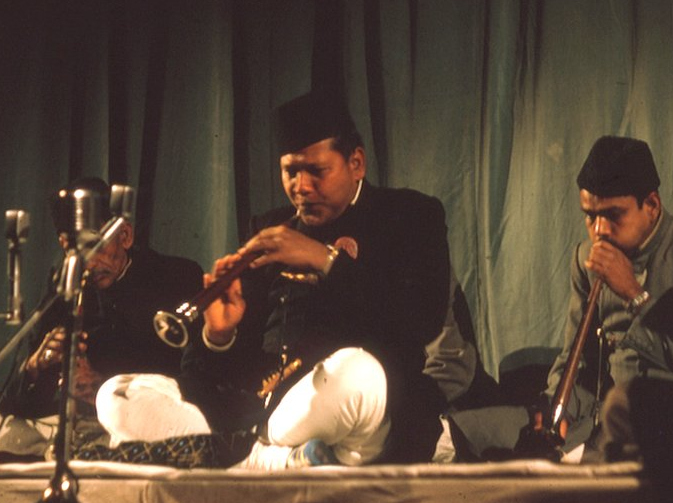“God knows no religion. God belongs to mankind. I realized this while playing at the Balaji temple.”
Quote, Encyclopedia of Bharat Ratnas
Ustad Bismillah Khan foi um músico indiano que tocava shehnai, instrumento de sopro da família do oboé, originário do subcontinente indiano. Apesar de o shehnai ser um instrumento antigo na tradição da música popular indiana, usado especialmente em cerimônias tradicionais, atribui-se a Khan o feito de ter elevado o instrumento ao nível de apresentação em concertos. Foi o terceiro artista de música clássica indiana a ser agraciado com o prêmio Bharat Ratna , a mais alta honraria civil de seu país. Obteve reconhecimento mundial pela sua execução do shehnai ao longo de mais de oito décadas. Bismillah Khan era quase sempre chamado com o título honorífico "Ustad" precedendo seu nome. Trata-se de título de origem persa, historicamente usado em menções a professores e artistas respeitados, principalmente músicos . Wikipedia

“God knows no religion. God belongs to mankind. I realized this while playing at the Balaji temple.”
Quote, Encyclopedia of Bharat Ratnas
He said ‘play my son’ but I was sweating. I stopped playing.
Khan used to do riyaz (practice) before the temple of Balaji as advised by his mamu (maternal uncle) who had also told him not talk to any body about anything that might happen. But when he told his mamu about his seeing Balaji, mamu was annoyed and slapped him.
Quote, Power Profiles
“Even if the world ends, the Music will still survive…. Music has no caste.”
Quoted in [Ekbal, Nikhat, Great Muslims of undivided India, http://books.google.com/books?id=JsDNDeHkb8AC&pg=PA45, 2009, Gyan Publishing House, 978-81-7835-756-0, 45–]
Quote
After this he was invited to play the Shehnai solo on the All India Radio
Quote, Encyclopedia of Bharat Ratnas
Zakir Hussain, the famous tabla player quoted in "The Dawn of Indian Music in the West" page=121
In reply to the Shia Maulvis in Iran who were arguing with him that Music should be banned, he sang the song in Raag Bhairavi and posed a question to them to which they had no answer.
Quote, Power Profiles
His reply to the hardliner Shia mullas who wanted to ban music.
Quote, Power Profiles
When he was perturbed at not being invited to play in concerts when other instrumentalists held solo performances, and it is when Lord Balaji whispered in his ears “All good things begin with Shehnai”.
Quote, Encyclopedia of Bharat Ratnas
Sukriya.
When he was asked to stay back in America following his concerts there, even with a promise that a Varanasi would be replicated for him there.
Quote, Encyclopedia of Bharat Ratnas
“Music lets me forget bad experiences. You cannot keep ragas and regrets in your mind together.”
Quotations by 60 Greatest Indians, Dhirubhai Ambani Institute of Information and Communication Technology http://resourcecentre.daiict.ac.in/eresources/iresources/quotations.html,
Quote
Raj Kumar in [Kumar, Raj, Essays on Indian Music, http://books.google.com/books?id=wwwX6DWfn3gC&pg=PA205, 1 January 2003, Discovery Publishing House, 978-81-7141-719-3, 205–]
Peter Lavezzoli in his bo [Lavezzoli, Peter, The Dawn of Indian Music in the West, http://books.google.com/books?id=OSZKCXtx-wEC&pg=PA375, 24 April 2006, Continuum, 978-0-8264-1815-9, 32]
I am calling the God. I am thinking of him. I am searching for Him. Why do you call my search haraam?
In reply to the Shia Maulvis in Iran who were arguing with him that Music should be banned, he sang the song in Raag Bhairavi and posed a question to them to which they had no answer.
Quote, Power Profiles